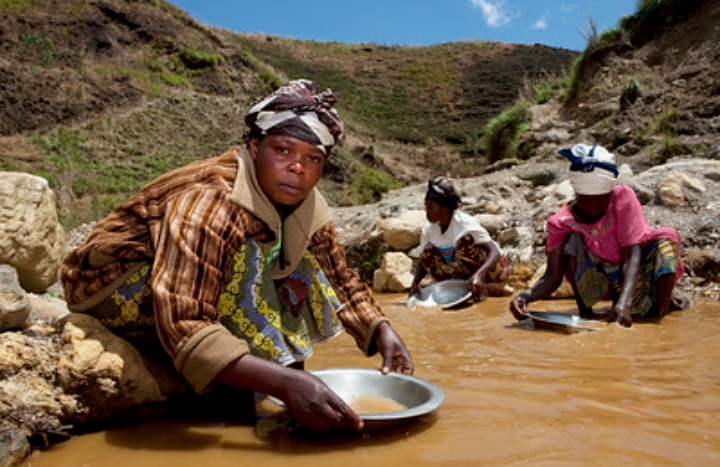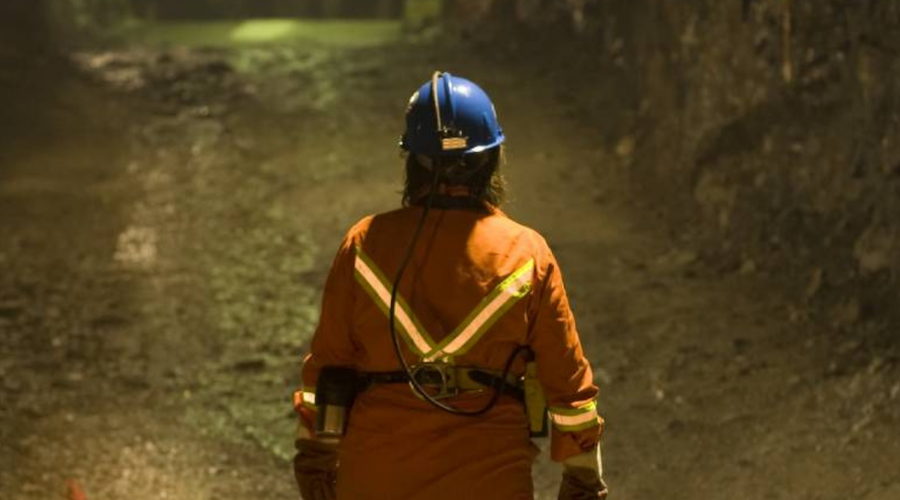Enhancing Gender Inclusion in Nigeria’s Mining Sector: Opportunities and Challenges for Women
- July 22, 2025
- Posted by: Hub Admin
- Categories: Article, Climatic Justice, Environmental Protection, Human Rights, Poverty Eradication

By Ihuoma Janefrancis Anyanwu
Introduction
Nigeria’s mining sector is evolving, and women are playing an increasingly vital role in driving this transformation. As gender equality improves, women in mining face overwhelming obstacles in progressing across the value chain due to low training opportunities, limited access to mining licenses, inadequate financing, sexual violence, limited leadership representation, and loss of livelihoods. Addressing these issues is critical for unlocking the full potential of the sector and promoting sustainable development, as there is immense potential that increased gender inclusion holds for the sector’s sustainable growth, innovation, and overall economic development in Nigeria. This paper explores the opportunities for women in the Nigerian mining sector while addressing the persistent challenges that hinder their full and equitable participation. It also highlights ongoing initiatives and proposes further strategies to foster a more inclusive mining sector.
Opportunities for Women in Nigeria’s Mining Sector

Women in mining continue to play vital roles, encompassing everything from ore processing to trading, as the push for gender inclusion in Nigeria’s mining industry creates numerous opportunities for women throughout the value chain. The impact of women’s participation in mining goes far beyond their earnings. Women are playing a significant role in Nigeria’s mining sector, particularly in small-scale mining, where they work as artisans and traders. Even with its inherent challenges, it provides a direct source of income, contributing to household livelihoods and poverty reduction. Beyond ASM, as the formal mining sector expands, women have opportunities to gain formal employment, leading to more stable incomes and access to benefits.
While traditionally relegated to manual labour like crushing, grinding, and sieving, women are increasingly breaking into diverse roles. This includes skilled positions such as geologists, engineers, environmental specialists, health and safety officers, and even managerial and leadership roles. The evolving technological landscape of mining, with increased automation and data analytics, also diminishes the emphasis on brute physical strength, creating new avenues for women with technical expertise. Women can play a significant role in mineral value addition, from processing raw materials to crafting finished products, particularly in the gemstone and ornamental sectors. Opportunities exist for women to establish their mining businesses, form cooperatives, and engage in trading, thus moving beyond mere labour and capturing a greater share of the economic benefits.
Organisations like Women in Mining Nigeria (WIMIN) are actively advocating for policy reforms and legislative changes that promote gender equality in the sector. This advocacy creates a platform for women’s voices to be heard, influencing decisions on licensing, access to finance, and working conditions. The recent launch of a national gender strategy for the mining and steel sectors by the Federal Government demonstrates a commitment to prioritise gender equity, opening doors for women to shape the future of the industry. Furthermore, there’s a growing emphasis on providing training and capacity-building programs tailored to women in mining. These initiatives aim to equip them with the technical skills, business acumen, and leadership capabilities necessary to thrive in the sector. Such programs can range from modern mining techniques to financial literacy and entrepreneurship training.
Challenges for Women in Nigeria’s Mining Sector
Despite the emerging opportunities, women in Nigeria’s mining sector face a myriad of challenges that impede their full participation and advancement. Women work in various mining settings, from large-scale to artisanal and small-scale, but encounter significant barriers to their full and dignified participation. Safety concerns, hazardous environments, and physical demands expose women to harmful substances, heavy machinery accidents, and extreme working conditions. Additionally, they face a higher risk of sexual and gender-based violence (SGBV), a danger only recently recognised.
In most African environments, cultural norms often dictate traditional gender roles, assigning men to labour-intensive mining activities while women are relegated to domestic duties or less visible, informal roles within the mining value chain. Stereotypes about women’s physical capabilities and suitability for mining professions persist, leading to discrimination and limited access to certain roles. While progress is being made, certain legal frameworks, such as archaic labour laws, have historically restricted women’s participation, including prohibitions on women working underground or during certain hours. Furthermore, the lack of gender-sensitive provisions in mining regulations can lead to discrimination in accessing licenses, land, and other critical resources. Women often face significant financial constraints, struggling to access capital, equipment, and technology necessary for larger-scale or more efficient mining operations. This is intensified by a lack of collateral, limited financial literacy, and gender biases in lending institutions.
Furthermore, women in mining, particularly in ASM, are exposed to significant health and safety risks. These include exposure to hazardous substances like mercury and lead, lack of protective gear, inadequate sanitation facilities, and vulnerability to accidents due to poor working conditions. As women engage in informal mining, this involvement often means that they lack legal protection and recourse. Women in the mining sector frequently encounter gender-based discrimination, including wage disparities, limited opportunities for promotion, and workplace biases. Instances of sexual harassment and exploitation, particularly in remote mining sites, are also a grave concern. There is also a scarcity of disaggregated data on women’s participation in the Nigerian mining sector, making it difficult to accurately assess their contributions, identify specific challenges, and design targeted interventions. This lack of visibility can perpetuate women’s marginalisation in the mining sector.
Strategies to Foster Inclusiveness in the Sector
Embracing gender diversity is critical to unlocking higher productivity and improving the Nigerian mining industry’s reputation. Gender inclusion in Nigeria’s mining sector is not merely a matter of social equity but a strategic imperative for sustainable development. The efforts of organisations like Women in Mining Nigeria (WIMIN) and the Nigerian government have introduced several policies to empower women in mining. Programs led by the Ministry of Mines and Steel Development, for example, provide targeted grants and skills development opportunities that encourage women to take up roles in mineral extraction and mine safety (Alake 2024). International partners like the World Bank and the African Development Bank are also stepping in to support Nigerian women in mining. By partnering with local stakeholders, these organisations offer both financial and technical assistance, with a particular focus on women in artisanal and small-scale mining (ASM) (Mohammed, 2025).
However, there is a need for:
- Policy Reforms: The mining laws should be amended to eschew every form of discrimination, while implementing gender-sensitive regulations to ensure equitable access to licenses, resources, and fair working conditions should be encouraged.
- Capacity Building: Investing in targeted training and skill development programs for women, equipping them for diverse roles and entrepreneurial ventures.
- Access to Finance: Developing tailored financial products and services, coupled with financial literacy training, to empower women miners.
- Health and Safety: Implementing and enforcing strict health and safety standards, providing adequate protective equipment, and ensuring access to healthcare facilities.
- Awareness and Advocacy: Challenging stereotypes, promoting positive role models, and fostering a culture of inclusivity through sustained advocacy and public awareness campaigns.
- Data Collection: Systematically collecting and analysing gender-disaggregated data to inform policy and track progress.
Conclusion
Enhancing gender inclusion in Nigeria’s mining sector presents a mix of opportunities and formidable challenges. By addressing these challenges and leveraging the opportunities, Nigeria can unlock the full potential of its female workforce, fostering a mining sector that is not only economically robust but also socially equitable and truly sustainable. With new strategies and dedicated organisations leading advocacy, some progress is being made in integrating women at all levels from artisanal mining to executive leadership. However, for gender inclusion to have a transformative impact, robust policy implementation, cultural shifts, and sustained investment in women’s skills and safety are critical.
References
Aina, D. (2024) . Alake promises gender equity in mining sector, Punch Newspapers. Available at: https://punchng.com/alake-promises-gender-equity-in-mining-sector/ (Accessed: July 21, 2025).
Mohammed, A.K. (2025) “The Role of Women in Nigeria’s Mining Sector and Operations.” Nigerian Mining Marketplace, 13 June. Available at: https://nigerianmining.com/the-role-of-women-in-nigerias-mining-sector-opportunities-and-challenges/ (Accessed: July 21, 2025).
